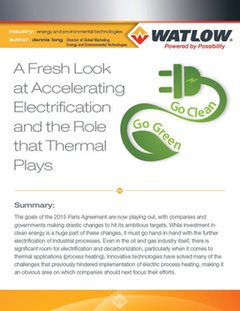Decarbonization, electrification and the case for modern electric process heaters
Companies in the oil and gas industry are taking bold steps to reduce their carbon footprint. The overall strategy to tackle carbon emissions relies not only on alternative energy investment and increased efficiency, but also converting key industrial processes to electric. Here Volker Metzger, Applied Thermal Expert for Europe at industrial heating technology manufacturer Watlow, explores the role of electric heating technologies in decarbonizing industry.
Discover More
Download Whitepaper
The pressure to electrify
Though there are still passionate debates about the scope and causes of climate change, governments and industry leaders are taking huge steps to meet climate change goals, especially with regards to decarbonization. According to the We Mean Business Coalition, over 700 companies have made far-reaching climate commitments, including many big players in the oil and gas industry
What is striking about the pressure to address climate change is that it does not come from one segment of the population, or from one international agreement. This means that even if a driver for change such as The Paris Agreement were to disappear, there would still be significant pressure to decarbonize and thus larger capital investments in electrification and decarbonization are still completely justified.
The Paris Agreement
The event that caused many energy companies to consider decarbonization strategies more seriously was the 2015 Paris Climate Conference, organized by the United Nations Framework Convention on Climate Change (UNFCCC). This led to a broad consensus about climate change and what needed to be done to combat it. The UNFCCC parties agreed that, to avoid the most catastrophic effects of climate change, the increase in global average temperature would need to be kept to less than two degrees Celsius (°C) above pre-industrial levels. The conference resulted in the “Paris Agreement,” adopted by all UNFCCC parties, which was a first legally binding global climate agreement of its kind.
The role of electric heat exchangers
Electrification of industrial processes is one of the key strategic pillars for addressing climate change concerns. Many industries use gas-fired heaters, but we’re seeing a gradual shift to large electric heat exchangers. One challenge of this change is that electric heaters need to be able to accommodate the larger wattage and amperage requirements of these processes, which must be balanced with another challenge — control.
Adequate control of the heater is needed to ensure that processes can be performed safely. Qualities of electric heat exchangers and electric process heaters have seen numerous innovations and improvements over the past decade, such as enhanced fluid dynamics, Continuous Helical Flow Technology™ and higher watt densities, which contribute to a heater with a smaller footprint, less fouling and greater safety features.
Enhanced fluid dynamics heat exchangers are engineered for advanced flow throughout the system, without compromising the integrity of the heating elements, media being heated and vessel, which provides significantly improved heat transfer rates and consistent performance across the vessel.
Some heat exchanger designs have dead zones where hot spots can occur, which exacerbates the coking process, leading to fouling and the need for further maintenance.
Continuous Helical Flow Technology offers ultra-high heat transfer rates with minimal fluid bypass, eliminating these dead zones and contributing to a smaller footprint.
In addition, higher watt densities incorporated into electric heat exchangers allow for designs that take advantage of increased heat flux. This can help to make processes more efficient and less costly while still meeting critical temperature requirements, reducing overall footprint and providing a safer operation.
When selecting an electric heater manufacturer in the process of electrifying your processes, it’s crucial to ensure the company can provide safe and reliable heating solutions that contribute towards a greener footprint. With over a century of experience developing, testing and validating electric heat exchanger designs, Watlow’s HELIMAX™ heat exchanger uses these innovations to improve performance, heater life and minimize carbon footprint, allowing for reduced maintenance intervals, leading to increased productivity.
Although progress is being made towards decarbonizing energy processing, there is still a long way to go. Switching to electric heat exchanges with advanced fluid dynamics, Continuous Helical Flow Technology and higher watt densities can aid the journey of electrification and decarbonization much more efficiently.
For more information about Watlow’s range of industrial heating equipment, go to www.watlow.com or email watlowleads@watlowleads.com.
ABOUT Watlow
Founded in 1922, Watlow strives to be the leading provider of thermal solutions for the world’s most demanding applications. Utilizing our advanced technology, leading companies apply our thermal systems, which are ideally suited for vital applications such as clean and environmentally friendly energy systems and processes, front-end semiconductor processing and lifesaving medical and clinical equipment.
Since 1922, Watlow has grown in product capability, market experience and global reach. The company holds more than 980 patents and employs 2,000 employees working in nine manufacturing facilities and three technology centers in the United States, Mexico, Europe and Asia. Watlow also has sales offices in 50 countries around the world. The company continues to grow, while the commitment remains the same — to provide its customers with superior products and services for their individual needs.
For further information contact:
Johann Lainer
Tel.: +43 664 88188439
E-Mail: jlainer@watlow.com
Watlow Plasmatech GmbH,
Brennhoflehen-Kellau 156,
5431 Kuchl,
Austria
For press enquiries contact:
Courtney Cowperthwaite or Francesca Avigo – Stone Junction Ltd
1 St Mary's Place, St Mary's Grove,
Stafford, Staffordshire,
ST16 2AR
Tel.: +44 (0) 1785 225416
E-mail: courtney@stonejunction.co.uk or francesca@stonejunction.co.uk

